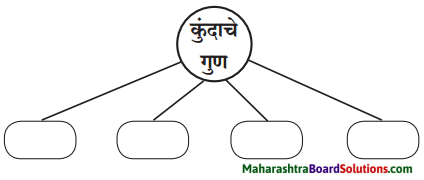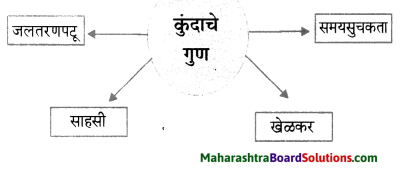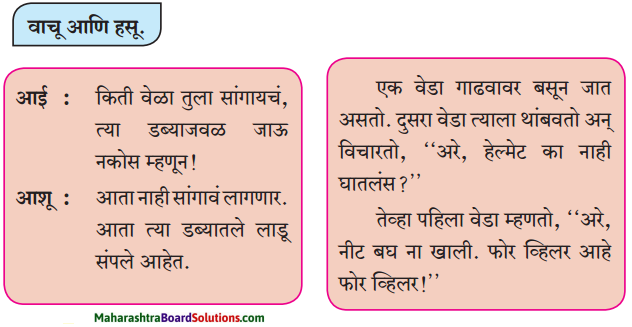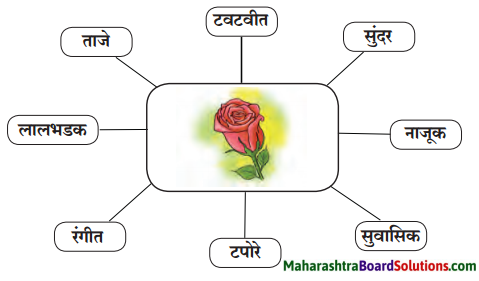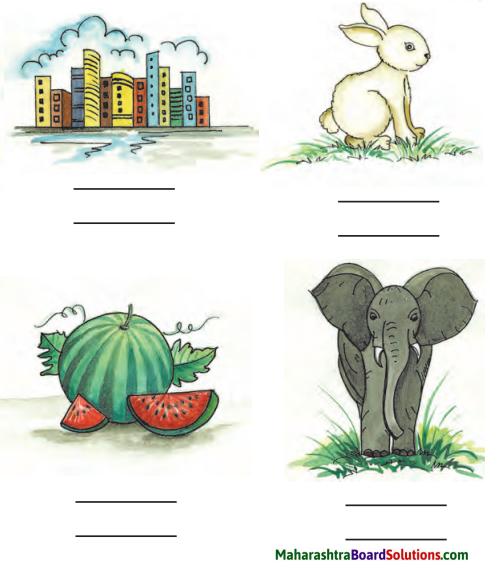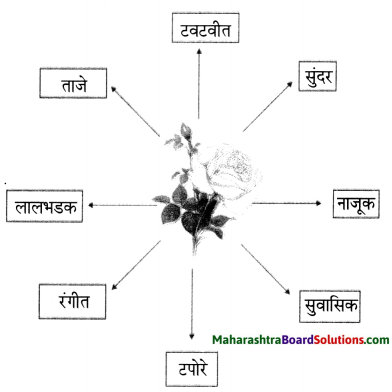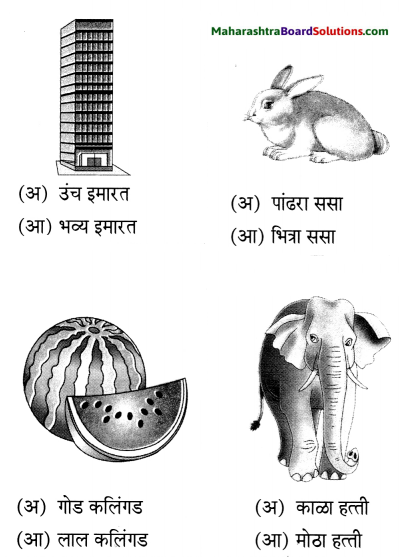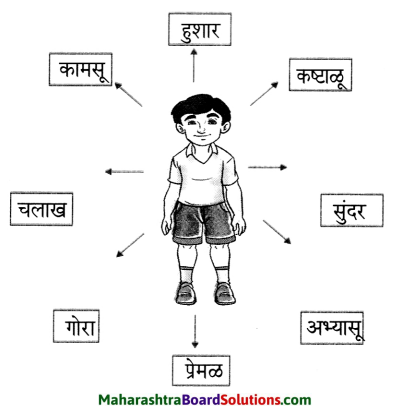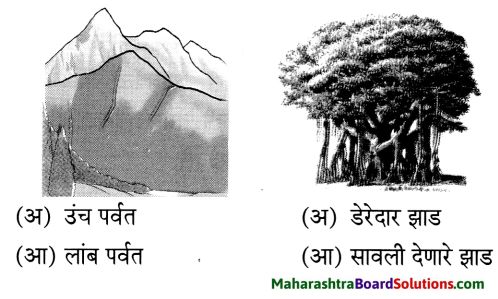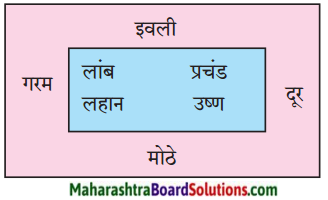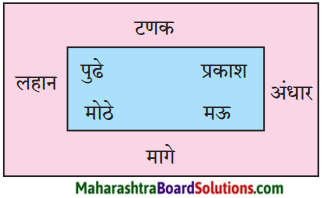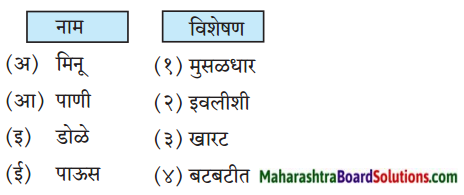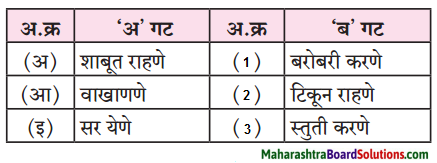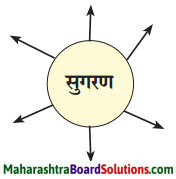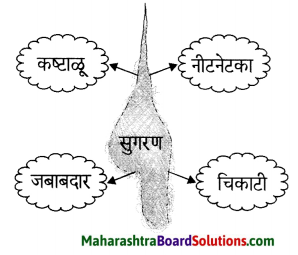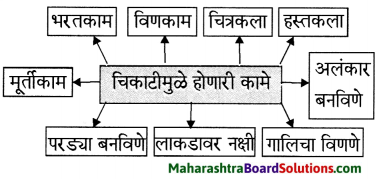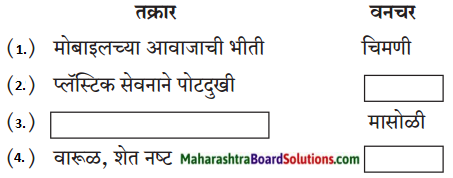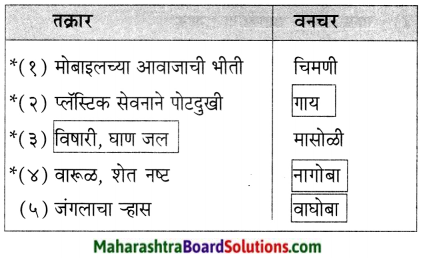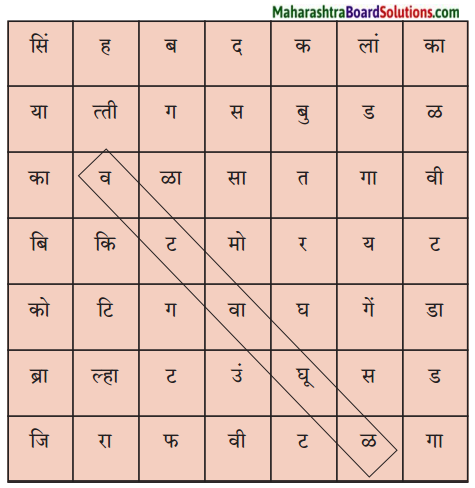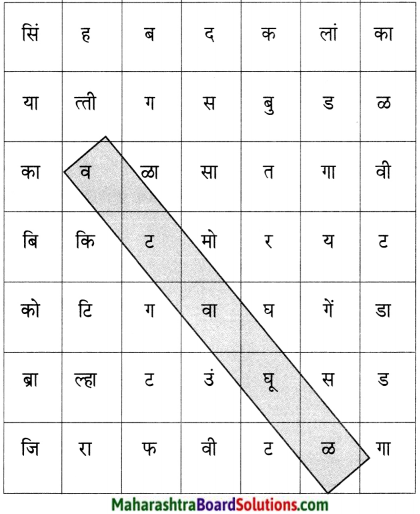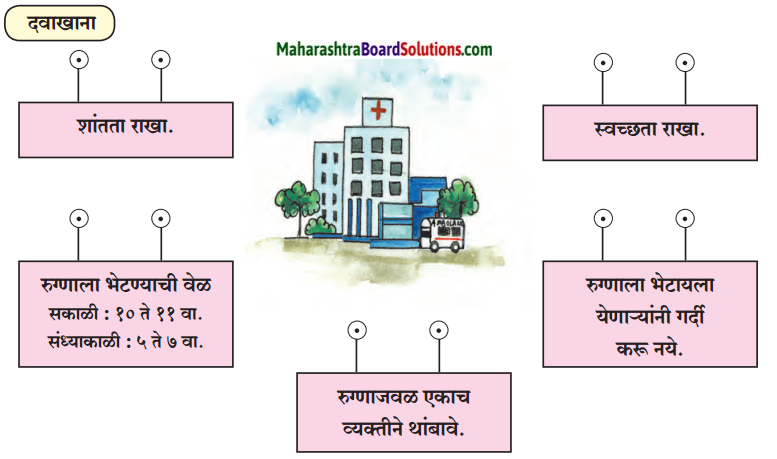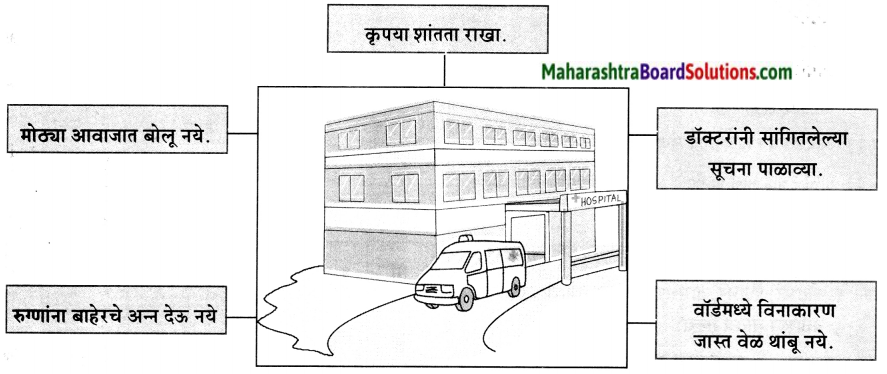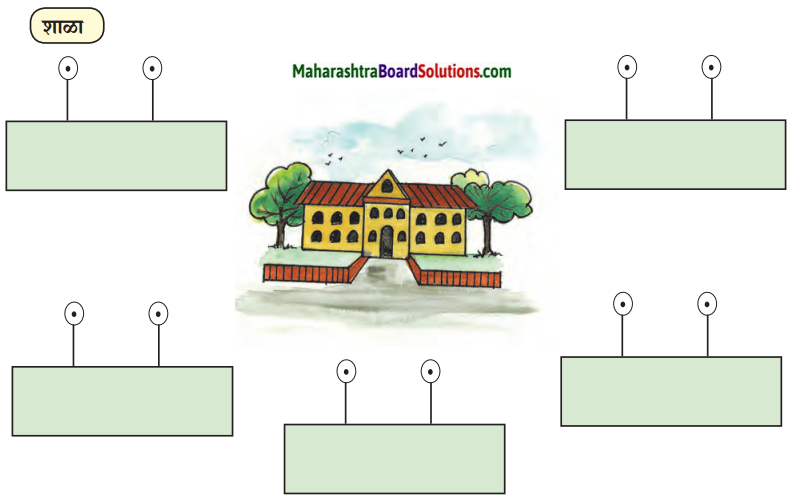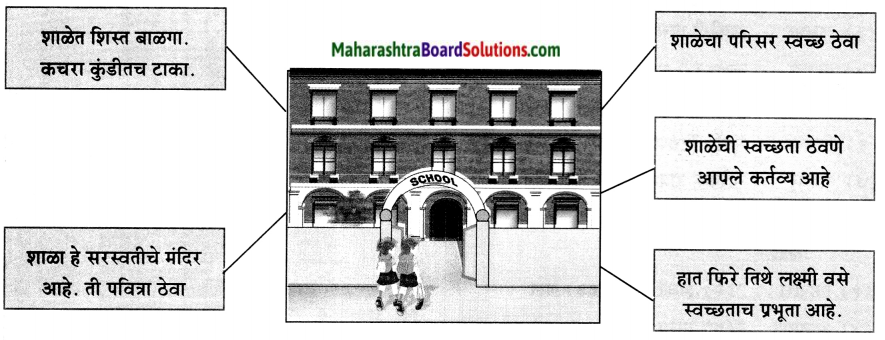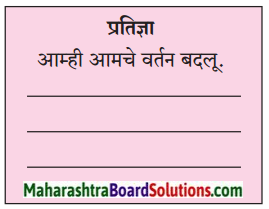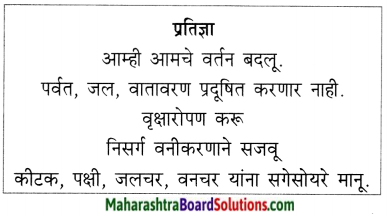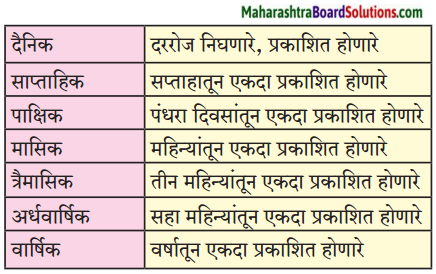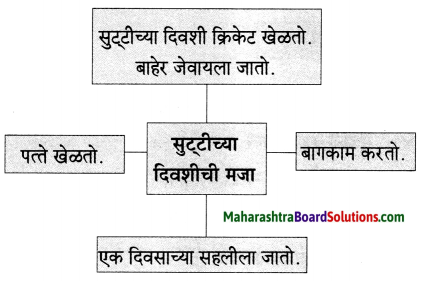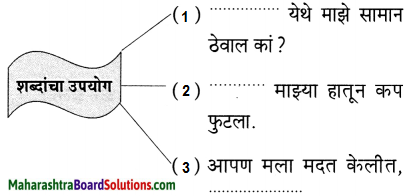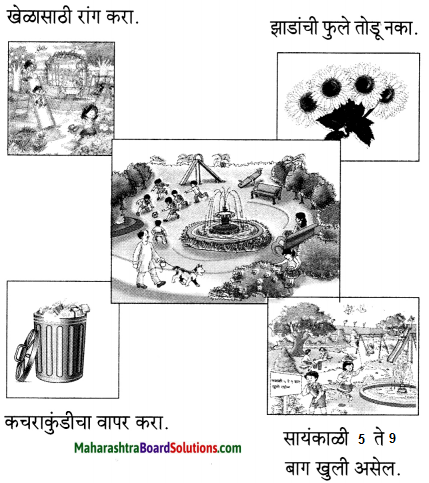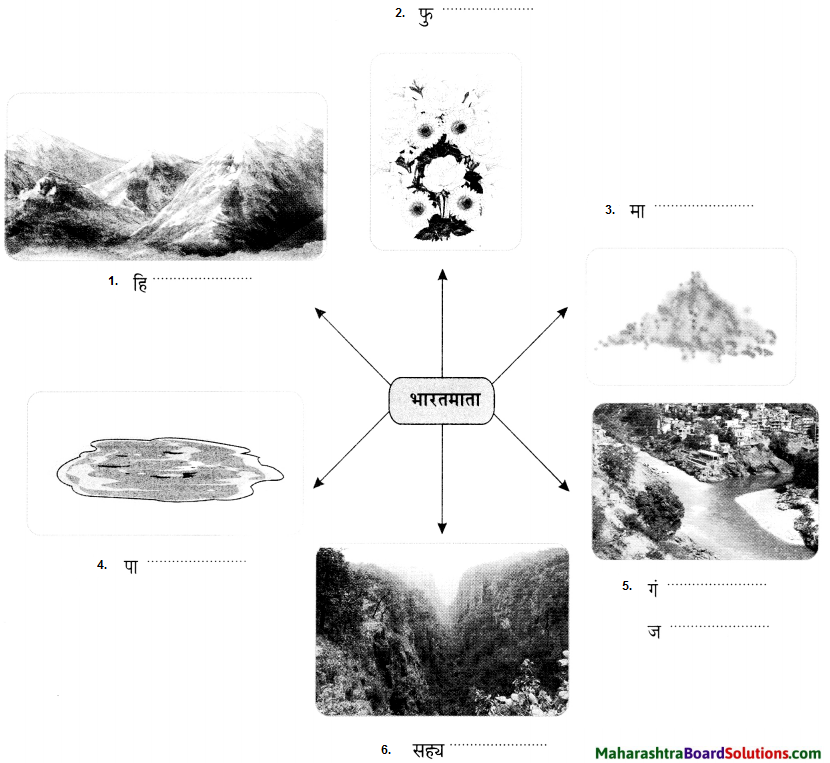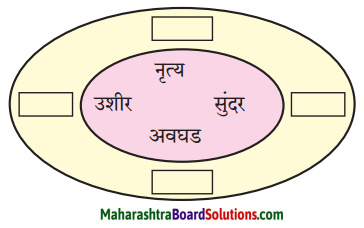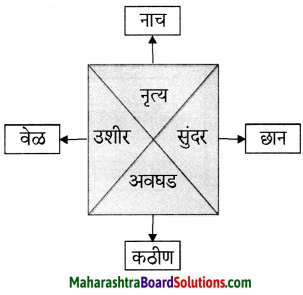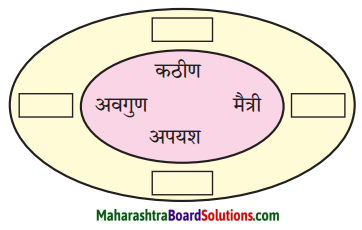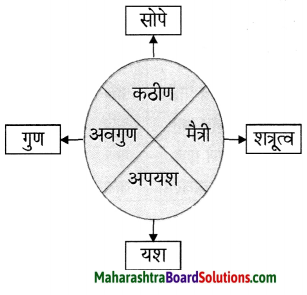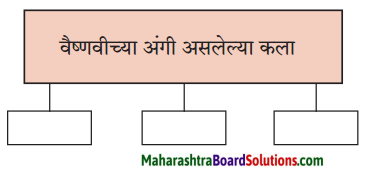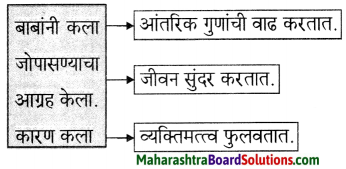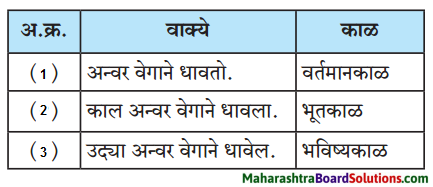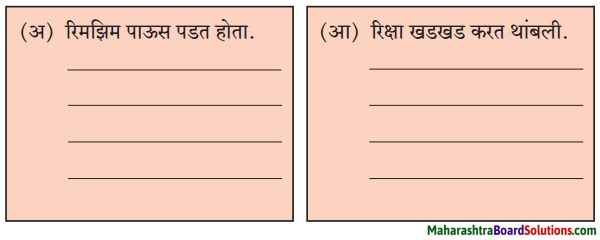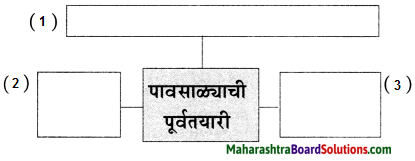Balbharti Maharashtra State Board Class 6 Marathi Solutions Sulabhbharati Chapter 14 अप्पाजींचे चातुर्य Notes, Textbook Exercise Important Questions and Answers.
Class 6th Marathi Chapter 14 अप्पाजींचे चातुर्य Question Answer Maharashtra Board
Std 6 Marathi Chapter 14 Question Answer
Marathi Sulabhbharti Class 6 Solutions Chapter 14 अप्पाजींचे चातुर्य Textbook Questions and Answers
1. एका वाक्यात उत्तर लिहा.
प्रश्न अ.
अप्पाजींनी बैलगाडीत कशाचे पीक घ्यायला लावले?
उत्तर:
अप्पाजींनी बैलगाडीत कोबीचे पीक घ्यायला लावले.
![]()
प्रश्न आ.
उत्कृष्ट दर्जाची मूर्ती कोणती?
उत्तरः
ज्या मूर्तीच्या कानात घातलेली तार तेथेच अडून राहिली, ती तिसरी मूर्ती उत्कृष्ट दर्जाची होय.
प्रश्न इ.
कलिंगचा राजा संतुष्ट का झाला?
उत्तरः
अप्पाजींनी तीनही मूर्तीचा दर्जा बरोबर ओळखल्याने कलिंग राजा संतुष्ट झाला.
2. तीन – चार वाक्यांत उत्तरे लिहा.
प्रश्न अ.
अप्पाजींनी ताजी कोबी कलिंग देशाकडे कशी पाठवली?
उत्तरः
राजाने अप्पाजींच्या सांगण्याप्रमाणे एका गाडीत माती भरून त्यात कोबीच्या बिया पेरून ती कलिंग राज्याकडे रवाना केली. गाडीवान प्रवासात रोज कोबींच्या रोपांना पाणी देत असे. तीन महिन्यांनी ती बैलगाडी कलिंग राज्यात पोहचली. अशाप्रकारे कलिंग राजाला ताजी कोबी मिळाली.
![]()
प्रश्न आ.
कलिंगच्या राजाने अप्पाजींची दुसऱ्यांदा कशी परीक्षा घेतली?
उत्तरः
कलिंगच्या राजाने दुसऱ्यांदा एकसारख्या दिसणाऱ्या तीन मूर्ती मागवल्या व म्हणाला, ‘या तीनही मूर्ती दिसायला सारख्या असल्या, तरी यांतली एक मूर्ती निकृष्ट आहे, दुसरी मध्यम दर्जाची आहे आणि तिसरी उत्कृष्ट आहे. या सारख्या दिसणाऱ्या तीन मूर्तीमधील उत्कृष्ट कोणती ते मला
सांगा.’
अप्पाजींनी एक लवचिक तार घेतली. ती पहिल्या मूर्तीच्या कानात घातली. ती तार मूर्तीच्या तोंडातून बाहेर पडली. अप्पाजी म्हणाले, ‘ही निकृष्ट मूर्ती आहे! नंतर अप्पाजींनी ती तार दुसऱ्या मूर्तीच्या कानात घातली. ती तार त्या मूर्तीच्या दुसऱ्या कानातून बाहेर पडली. अप्पाजी म्हणाले, ‘ही मध्यम दर्जाची मूर्ती होय.’ तिसऱ्या मूर्तीवरही अप्पाजींनी हाच प्रयोग केला. त्या मूर्तीच्या कानात घातलेली तार तिच्या तोंडातून वा दुसऱ्या कानातून कोठूनच बाहेर पडली नाही. अप्पाजी म्हणाले, ‘ही उत्कृष्ट मूर्ती.’ अशा प्रकारे परीक्षा घेतली.
प्रश्न इ.
मूर्तीच्या तोंडात घातलेली तार तोंडातून बाहेर येते याचा अप्पाजींनी कोणता अर्थ लावला?
उत्तरः
एखादा माणूस ज्या अफवा ऐकतो, त्याचा खरेखोटेपणा पडताळून न पाहता जर तो त्या दुसऱ्यांना सांगू लागला, तर त्याचे व समाजाचेही हित होत नाही. असा अर्थ मूर्तीच्या कानात घातलेली तार तोंडातून बाहेर पडलेल्या मूर्तीबद्दल सांगितला.
![]()
प्रश्न ई.
अप्पाजींच्या मते उत्तम माणूस कोणता?
उत्तरः
अफवा ऐकल्यावर जो माणूस दुसऱ्या कानाने ती सोडून देत नाही किंवा लगेच ती दुसऱ्याला सांगत नाही, तर तिच्या खरेखोटेपणाची खात्री करून घेतो आणि आपण काय ऐकले ते पुराव्याशिवाय सांगत नाही, तो माणूस उत्तम. असे अप्पाजींचे मत आहे.
3. पाणी टंचाईमुळे तुम्हांला पाणी दुरून आणायचे आहे. कमी श्रमात ते आणण्यासाठी तुम्ही काय प्रयत्न कराल?
प्रश्न 1.
पाणी टंचाईमुळे तुम्हांला पाणी दुरून आणायचे आहे. कमी श्रमात ते आणण्यासाठी तुम्ही काय प्रयत्न कराल?
4. विरूद्धार्थी शब्द लिहा.
प्रश्न 1.
विरूद्धार्थी शब्द लिहा.
उत्तरः
(अ) हित × अहित
(आ) निकृष्ट × उत्कृष्ट
![]()
5. खाली दिलेल्या उदाहरणाप्रमाणे चौकट पूर्ण करा.
प्रश्न 1.
खाली दिलेल्या उदाहरणाप्रमाणे चौकट पूर्ण करा.

उत्तरः
| गाडी – गाडीवान | चतुर – चतुराई | खरा – खरेपणा |
| धन – धनवान | महाग – महागाई | साधे – साधेपणा |
| दया – दयावान | स्वस्त – स्वस्ताई | शहाणा – शहाणपणा |
| बल – बलवान | नवल – नवलाई | भोळा – भोळेपणा |
6. खालील शब्द वाचा व समजून घ्या.
प्रश्न 1.
खालील शब्द वाचा व समजून घ्या.
उत्तर:
- चतुर – चातुर्य
- चोरी – चौर्य
- क्रूर – कौर्य
- शूर – शौर्य
- सुंदर – सौंदर्य
- धीर – धैर्य
![]()
7. खालील शब्दांना तो, ती, ते शब्द लावून लिंग ओळखा.
प्रश्न 1.
- दरी
- पान
- पुस्तक
- माठ
- लाडू
- वही
उत्तर:
- ती दरी – स्त्रीलिंग
- ते पान – नपुंसकलिंग
- ते पुस्तक – नपुंसकलिंग
- तो माठ – पुल्लिंग
- तो लाडू – पुल्लिंग
- ती वही – स्त्रीलिंग
8. तुमच्या मित्राच्या / मैत्रिणीच्या चतुरपणाचे कौतुक झाल्याचा प्रसंग घरी व वर्गात सांगा.
प्रश्न 1.
तुमच्या मित्राच्या / मैत्रिणीच्या चतुरपणाचे कौतुक झाल्याचा प्रसंग घरी व वर्गात सांगा.
उत्तर:
आज रस्त्याने जात असता एक तरूण मुलगा कानात हेडफोन घालून मोबाईलची गाणी ऐकत रस्ता पार करत होता. त्याने डावी व उजवीकडे गाडी येताना पाहिलेच नाही. तेवढ्यात समोरून एक सुसाट गाडी येताना माझ्या मित्राला दिसली. ती गाडी सतत हॉर्न वाजवत होती, पण त्याच्या कानावर तो आवाज गेला नाही. आता अपघात होणारच होता एवढ्यात माझ्या तनय नावाच्या मित्राने समयसुचकता दाखवून त्याला पटकन मागे ओढले. म्हणून तो अपघात टळला. तनयचे कौतुक करावे तेवढे थोडेच.
![]()
9. अप्पाजींसारख्या अनेक चतुर व्यक्ती इतिहासात होऊन गेल्या आहेत. उदा., बिरबल, तेनालीराम. यांच्या गोष्टी मिळवा. वाचा. वर्गात सांगा.
प्रश्न 1.
अप्पाजींसारख्या अनेक चतुर व्यक्ती इतिहासात होऊन गेल्या आहेत. उदा., बिरबल, तेनालीराम. यांच्या गोष्टी मिळवा. वाचा. वर्गात सांगा.
10. खालील वेबमध्ये दिलेल्या शब्दांस विशेषणे लावा.

प्रश्न 1.
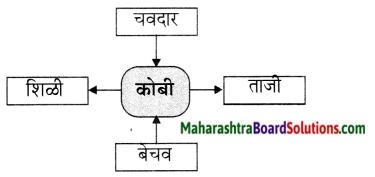
उत्तरः
- चवदार कोबी
- बेचव कोबी
- ताजी कोबी
- शिळी कोबी
![]()
प्रश्न 2.
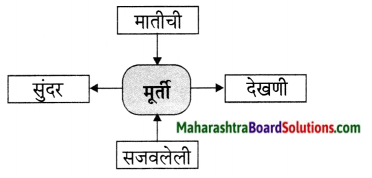
उत्तरः
- मातीची मूर्ती
- देखणी मूर्ती
- सजवलेली मूर्ती
- सुंदर मूर्ती
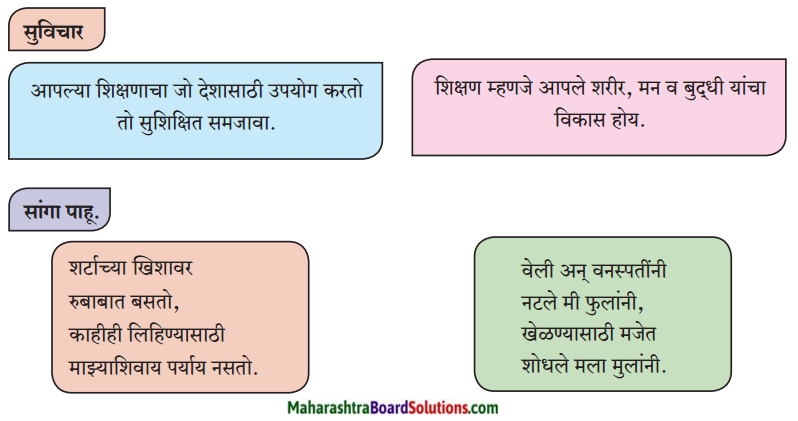
खालील तक्ता वाचा. समजून घ्या.
प्रश्न 1.
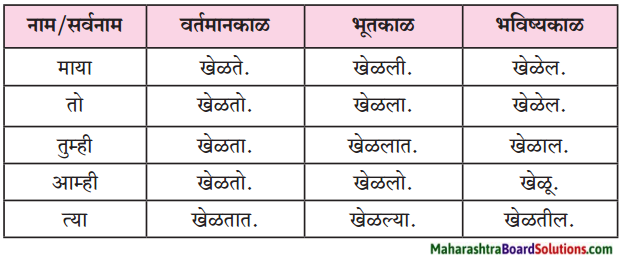
उत्तर:
| वतमान काळ | भूतकाळ | भविष्य काळ |
| 1. माया खेळते | माया खेळली | माया खेळेल |
| 2. तो खेळतो | तो खेळला | तो खेळेल |
| 3. तुम्ही खेळता | तुम्ही खेळलात | तुम्ही खेळाल |
| 4. आम्ही खेळतो | आम्ही खेळलो | आम्ही खेळू |
| 5. त्या खेळतात | त्या खेळल्या | त्या खेळतील |
![]()
दिलेल्या सूचनांप्रमाणे खालील वाक्यांत बदल करा.
प्रश्न 1.
रिमा सहलीला गेली. (भविष्यकाळ करा)
उत्तर:
रिमा सहलीला जाईल.
प्रश्न 2.
मला आंबा आवडतो. (भूतकाळ करा)
उत्तर:
मला आंबा आवडला.
प्रश्न 3.
चंदाने लाडू खाऊन संपवला. (वर्तमानकाळ करा)
उत्तर:
चंदा लाडू खात आहे.
प्रश्न 4.
सुभाष माझा मित्र आहे. (भूतकाळ करा)
उत्तर:
सुभाष माझा मित्र होता.
![]()
प्रश्न 5.
वंदना अभ्यास करते. (भूतकाळ करा)
उत्तर:
वंदनाने अभ्यास केला.
प्रश्न 6.
संजू क्रिकेट खेळतो. (भविष्यकाळ करा)
उत्तर:
संजू क्रिकेट खेळेल.
पूर, गाव, नगर,बाद ही अक्षरे असणाऱ्या गावांची, शहरांची, ठिकाणांची नावे खालील तक्त्यात लिहा.
प्रश्न 1.
पूर, गाव, नगर,बाद ही अक्षरे असणाऱ्या गावांची, शहरांची, ठिकाणांची नावे खालील तक्त्यात लिहा.
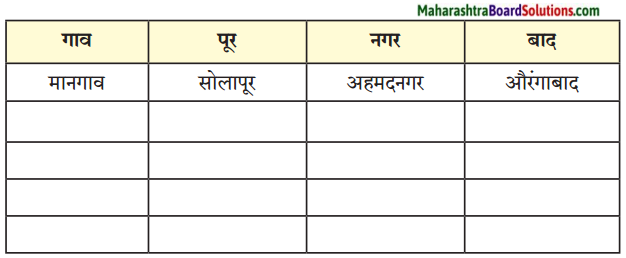
उत्तर:
| गाव | पूर | नगर | बाद |
| 1. मानगाव | सोलापूर | अहमदनगर | औरंगाबाद |
| 2. नागाव | कोल्हापूर | सह्याद्रीनगर | दौलताबाद |
| 3. सोनगाव | नागपूर | संभाजीनगर | उस्मानाबाद |
| 4. भरतगाव | कानपूर | हनुमाननगर | फिरोजाबाद |
| 5. धरणगाव | राजापूर | वैभवनगर | अहमदाबाद |
| 6. शेगाव | तारापूर | जामनगर | हैद्राबाद |
Class 6 Marathi Chapter 14 अप्पाजींचे चातुर्य Additional Important Questions and Answers
खालील प्रश्नांची प्रत्येकी एक-दोन वाक्यांत उत्तरे लिहा.
प्रश्न 1.
कृष्णदेवराय कोणत्या नगराचा राजा होता?
उत्तरः
कृष्णदेवराय विजयनगरचा राजा होता.
![]()
प्रश्न 2.
विजयनगरच्या प्रधानाचे नाव काय होते?
उत्तरः
विजयनगरच्या प्रधानाचे नाव अप्पाजी होते.
प्रश्न 3.
उत्तरकडे कोणते राज्य होते?
उत्तरः
उत्तरेकडे कलिंग राज्य होते.
प्रश्न 4.
त्या काळी वाहतूक कशातून होत असे?
उत्तरः
त्या काळी बैलगाडीतून वाहतूक होत असे.
प्रश्न 5.
बैलगाड्या कलिंग राज्यात पोहचायला किती महिने लागत?
उत्तरः
बैलगाड्या कलिंग राज्यात पोहचायला तीन महिने लागत.
प्रश्न 6.
कलिंग राजाने एकूण किती मूर्त्या आणल्या?
उत्तरः
कलिंग राजाने एकूण तीन मूर्त्या आणल्या.
![]()
प्रश्न 7.
निकृष्ट दर्जाची मूर्ती कोणती?
उत्तरः
मूर्तीच्या कानातून घातलेली तार मूर्तीच्या तोंडातून बाहेर पडली ही निकृष्ट दर्जाची मूर्ती होय.
प्रश्न 9.
मध्यम दर्जाची मूर्ती कोणती?
उत्तर:
ज्या मूर्तीच्या एका कानातून घातलेली तार दुसऱ्या कानातून बाहेर पडली ती मूर्ती मध्यम दर्जाची होय.
व्याकरण व भाषाभ्यास
प्रश्न 1.
खालील शब्दांचे समानार्थी शब्द लिहा.
- जुनी
- गोष्ट
- चतुर
- राजा
- निरोप
- निकृष्ट
- उत्कृष्ट
- कान
- माणूस
- खात्री
- संतुष्ट
- पुरावा
उत्तर:
- पुराणी
- कथा
- हुशार
- नृप
- सांगावा
- तकलादू
- चांगली
- कर्ण
- मनुष्य
- विश्वास
- समाधानी
- दाखला
![]()
प्रश्न 2.
खालील शब्दांचे विरूद्धार्थी शब्द लिहा.
- जुनी
- उत्तर
- प्रश्न
- चतुर
- चवदार
- इच्छा
- जलद
- ताजी
- सारखा
- बाहेर
- माणूस
- खरे
- नुकसान
उत्तर:
- नवी
- दक्षिण
- उत्तर
- मुर्ख
- बेचव
- अनिच्छा
- सावकाश
- शिळी
- वेगळा
- आत
- स्त्री
- खोटे
- फायदा
अप्पाजींचे चातुर्य Summary in Marathi
पाठपरिचय:
विजयनगरमध्ये असणाऱ्या कृष्णदेवरायच्या राज्यात त्याचे प्रधान अप्पाजी फार चतुर होते. उत्तरेकडे असलेल्या कलिंग राजाने अप्पाजींची चतुराई कशी पारखली, त्याच्या परीक्षेला अप्पाजींनी कसे कौशल्याने तोंड दिले याचे वर्णन या पाठात आले आहे.
![]()
शब्दार्थ:
- चातुर्य – हुशारी (cleverness)
- जुनी – प्राचीन (Many year’s ago)
- प्रधान – मंत्री (Minister)
- उत्तर – North
- चतुराई – हुशारी (cleverness)
- निरोप – संदेश (Message)
- चवदार – रुचकर (tasty)
- कोबी – एक फळभाजी (cabbage)
- आस्वाद – चव (taste, flavour)
- त्या काळी – त्या वेळी (that time)
- जलद – गतीमान (fast)
- साधने – वाहने (vehicle)
- बैलगाडी – Bullock cart
- राज्य – state
- ताजी – Fresh
- कुजून – सडून (rotten)
- गाडीवान – गाडी चालवणारा, वाहक (Driver)
- बी – बीज (seed)
- पेरणे – जमिनीत बी टाकणे (sowing)
- रवाना – पाठवणे (to send)
- कौतुक – प्रशंसा (to admire)
- परीक्षा – कसोटी (test)
- एकसारख्या – समान, सारख्या (same)
- मूर्ती – प्रतिमा (Statue)
- निकृष्ट – कमी दर्जाची (in ferier)
- उत्कृष्ट – उत्तम (superior, excellent)
- लवचिक – हलणारी (Flexible)
- तार – धातूचा तंतू (wire)
- अफवा – खोटी बातमी (rumour)
- हित – कल्याण, भले (interest)
- नुकसान – तोटा (Loss)
- संतुष्ट – समाधानी (satisfied)
- पुरावा – दाखला (proof, evidence)
वाक्प्रचार व अर्थ:
- चतुराई पाहणे – हुशारी पाहणे
- परीक्षा घेणे – कौशल्य तपासून पाहणे
- खरेखोटेपणा पडताळणे – सत्य, असत्य तपासणे
- हित नसणे – भले नसणे, कल्याण नसणे
- अफवा ऐकणे – खोटी बातमी ऐकणे.
- खात्री करणे – तपासून, चौकशी करणे
Marathi Sulabhbharati Class 6 Solutions
